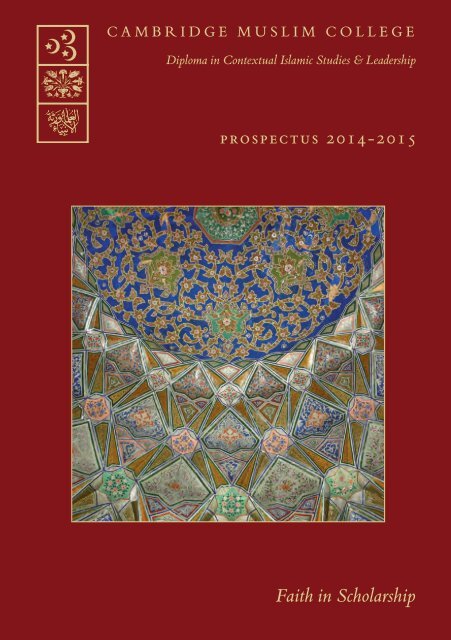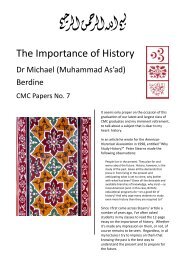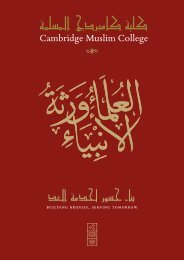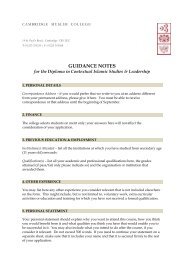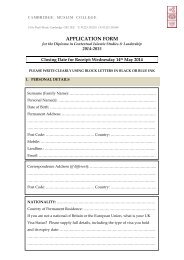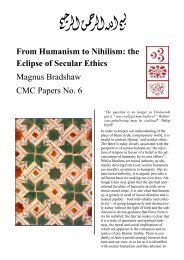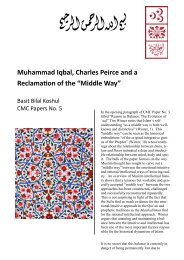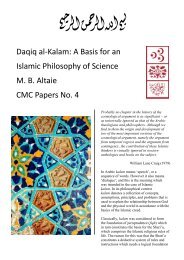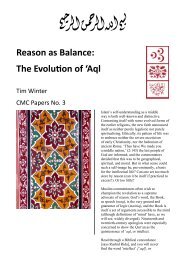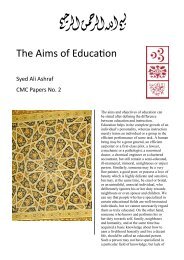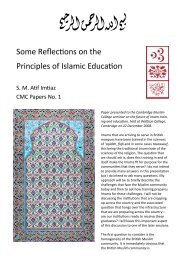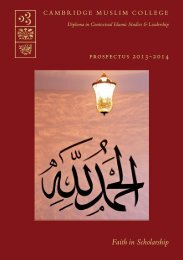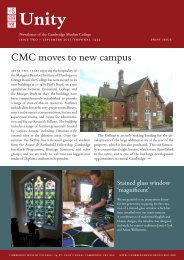Diploma Prospectus 2014-2015
You also want an ePaper? Increase the reach of your titles
YUMPU automatically turns print PDFs into web optimized ePapers that Google loves.
C A M B R I D G E M U S L I M C O L L E G E<br />
<strong>Diploma</strong> in Contextual Islamic Studies & Leadership<br />
prospectus <strong>2014</strong>-<strong>2015</strong><br />
Faith in Scholarship<br />
CMC <strong>Prospectus</strong> • <strong>2014</strong>-<strong>2015</strong> i
Welcome from the Dean<br />
As CMC enters its sixth year of operation, it’s with a sense of<br />
immense pride that we present our latest <strong>Prospectus</strong>. It is our<br />
privilege to offer our assistance to young scholars, and to equip them<br />
with the tools they need to face the many challenges ahead. We are<br />
grateful to our supporters and sponsors around the world, who with<br />
their prayers and their contributions have helped to reinforce CMC’s<br />
mission, and to make it the world-leading institution that it has now<br />
become.<br />
We have been proud to host some of the world’s major scholars in<br />
our public lecture series, and to have supported our graduates in their<br />
search for the most interesting opportunities. Nothing can be achieved,<br />
however, without the energy and sincerity of our students and staff.<br />
We hope and pray that we will continue to be blessed with the best of<br />
the Dar al-Ulum graduates in coming years, in the hope of earning the<br />
reward of those who ‘serve the servants of Sacred Knowledge.’<br />
Abdal Hakim Murad<br />
CMC <strong>Prospectus</strong> • <strong>2014</strong>-<strong>2015</strong> 1
23 CMC <strong>Prospectus</strong> • <strong>2014</strong>-<strong>2015</strong>
Welcome from the<br />
Academic Director<br />
The <strong>Diploma</strong> in Contextual Islamic Studies and Leadership is a unique and<br />
demanding year-long programme that has been specifically designed<br />
to meet the educational and training needs of graduates from Dar al-<br />
Ulums in the United Kingdom. The aim of the College is to introduce<br />
young ulama to science, history, literature, community development<br />
and the history of ideas so that they can become capable and confident<br />
ulama ready to serve the British Muslim community and wider society.<br />
We wish to invite you to consider applying for the <strong>Diploma</strong> in<br />
Contextual Islamic Studies and Leadership. Through the course of this<br />
intensive programme you will be taught by many teachers from<br />
British universities, including the University of Cambridge, across a<br />
broad range of subjects. You will meet many leaders from the Muslim<br />
community who have spent their lives in service of the community.<br />
You will meet experts from around the country who will come to the<br />
College so that they can pass on their learning and their experience to<br />
you.<br />
‘Be avid for that which benefits you’ and ‘Seek knowledge, even in<br />
China’. These are two well-known hadith. The <strong>Diploma</strong> in Contextual<br />
Islamic Studies and Leadership here at the Cambridge Muslim College is a<br />
unique learning opportunity. We are seeking the brightest and the best<br />
– those who have made the intention of humbly dedicating the rest of<br />
their lives in service to Sacred Knowledge and others – from the next<br />
generation of ulama to come and benefit from this opportunity. If you<br />
are excited by this opportunity and you have the courage to take up<br />
this challenge, then we urge you to apply.<br />
Syed MoHAMed Atif iMtiaz<br />
CMC <strong>Prospectus</strong> • <strong>2014</strong>-<strong>2015</strong> 3
Contents<br />
What is the Cambridge Muslim College? 7<br />
What is the <strong>Diploma</strong>? 9<br />
What is Taught and How? 11<br />
Course Modules 13<br />
College News & Developments 17<br />
Meet Some of Our Students 18<br />
Our Lecturers Include… 20<br />
Student Support 22<br />
What is it Like to Live and Study in Cambridge? 23<br />
Who can Apply? 25<br />
What are you Waiting for? 27<br />
Cambridge Muslim College<br />
14 st. PAul’s Road<br />
CAMbridge CB1 2ez<br />
T: 01223 355235 F: 01223 355568<br />
info@CAMbridgemusliMCollege.org<br />
www.CAMbridgemusliMCollege.org<br />
CMC <strong>Prospectus</strong> • <strong>2014</strong>-<strong>2015</strong> 5
What is the<br />
Cambridge Muslim College?<br />
The Cambridge Muslim College is a nondenominational institution<br />
for education, training and research in subjects important to the<br />
British Muslim community. It welcomes Muslims of all backgrounds<br />
who wish to deepen their pastoral skills and their awareness<br />
of contemporary developments in Britain and the world. It is<br />
independent of governments and is not affilliated to any Islamic<br />
movement, providing a prayerful context for strengthening da’wa<br />
skills, and scholarly resources to support all who care about the<br />
continuing health and dynamism of Britain’s Muslim community.<br />
The College is under the direction of Shaykh Abdal Hakim Murad<br />
(T. J. Winter), Shaykh Zayed Lecturer in Islamic Studies in the Faculty<br />
of Divinity at the University of Cambridge.<br />
“And say: My Lord! Increase me in knowledge.”<br />
SURA TA HA : 114<br />
CMC <strong>Prospectus</strong> • <strong>2014</strong>-<strong>2015</strong> 7
89 CMC <strong>Prospectus</strong> • <strong>2014</strong>-<strong>2015</strong>
What is the <strong>Diploma</strong>?<br />
The <strong>Diploma</strong> in Contextual Islamic Studies & Leadership is a oneyear<br />
course designed to help those who already possess a significant<br />
training in the Islamic sciences to develop, articulate and implement<br />
their knowledge effectively in Britain today. It is also aimed at helping<br />
students with a background in traditional Islamic studies to go on to<br />
join the mainstream of British further education. The course draws on<br />
Islamic sources for inspiration and guidance in all these aims, as well as<br />
providing the relevant skills and knowledge necessary in modern<br />
British society. It is taught by leading scholars and practitioners, from<br />
the University of Cambridge, the British Muslim community and<br />
elsewhere.<br />
The <strong>Diploma</strong> course has three inter-related aims:<br />
z To enable students to understand and engage with contemporary debates<br />
about the role of religion in general, and Islam in particular, in modern society;<br />
z To encourage the students to be compassionate and reliable spiritual and<br />
pastoral advisors to Muslims and others;<br />
z To equip students with practical skills to make them more effective leaders of<br />
Muslim institutions and to enhance their career prospects in all fields.<br />
CMC <strong>Prospectus</strong> • <strong>2014</strong>-<strong>2015</strong> 9
10 11 CMC <strong>Prospectus</strong> • <strong>2014</strong>-<strong>2015</strong>
What is Taught and How?<br />
The <strong>Diploma</strong> course combines academic, practical and pastoral skills<br />
through classroom teaching, teaching trips, and seminar discussions.<br />
Assessment is through a mixture of essays, other written work, oral<br />
presentations, practical projects and examinations. Students will have<br />
the opportunity to maintain and improve their knowledge of Islam<br />
through continued traditional learning in, for example, hifz al-Qur’an<br />
and memorisation of hadith. As well as learning in the classroom,<br />
students benefit from a programme of teaching trips designed both<br />
to broaden their learning and to relate their study directly to its<br />
application in their communities. The trips present examples of<br />
excellence and innovation already at work in community development,<br />
religious leadership, inter-faith dialogue, and other relevant areas.<br />
Students are also expected to participate in the CMC public lectures,<br />
a series of public events presenting the best in traditional and modern<br />
scholarship. Each term the College invites leading scholars and<br />
practitioners to give, for example, tafsir of part of the Qur’an, teach<br />
specific texts of great Muslim scholars, or to share the latest research<br />
and experience.<br />
Previous trips and lectures have included:<br />
TEACHing triPS<br />
z Shah Jahan Mosque, Woking<br />
z The Vatican (Rome)<br />
z House of Commons<br />
z Canterbury Cathedral<br />
CMC PubliC lectures<br />
z Mehmet Asutay, Reader in Political Economy, Durham University<br />
z Deborah Howard, Professor of Architectural History,<br />
University of Cambridge<br />
z Isam Eido, Fellow, Corpus Coranicum<br />
z Musa Furber, Research Fellow, Tabah Foundation<br />
CMC <strong>Prospectus</strong> • <strong>2014</strong>-<strong>2015</strong> 11
12 13 CMC <strong>Prospectus</strong> • <strong>2014</strong>-<strong>2015</strong>
Course Modules<br />
Introduction to Science This course covers the history of science and introduces<br />
the students to the development of and recent advances in science.<br />
This is achieved through examining the developments and advances in<br />
the physical sciences, life sciences and the medical sciences.<br />
Introduction to Western Intellectual History Covers the main trends of<br />
‘Western’ thought from Ancient Greece to postmodernity. The aim<br />
is to help students gain a critical understanding of the intellectual<br />
background of the 21st century. Particular reference will be made to the<br />
points of convergence and divergence with the intellectual history of<br />
Islamic civilisations.<br />
British Islam Today Adopts a historical approach by initially outlining the<br />
recent history of the British Muslim community and looking at early<br />
migration, the building of mosques, the Rushdie affair, the Northern<br />
riots of 2001 and the turn towards engagement. This is then followed by<br />
a series of classes which consider educational, health and employment<br />
outcomes and their effects on parts of the community.<br />
Islamic Counselling Introduces the theory and practice of counselling and<br />
dispute resolution with reference to Islamic models of addressing mental<br />
illness, distress and conflict. Students learn how to apply these methods<br />
and also when and how to seek further support to help those in need of<br />
advice or treatment.<br />
Islam and Religious Pluralism: Theological and Historical Perspectives<br />
Introduces and analyses normative Islamic understandings of religious<br />
pluralism. Beginning with a survey of how Muslim scholars have<br />
interpreted the canonical sources relating to non-Muslims, it also<br />
presents examples of how Muslims have historically organised<br />
themselves in multi-religious and multi-cultural societies.<br />
Sacred Art and Architecture of the World Introduces students to the history<br />
and meaning of sacred art. Within a comparative framework, particular<br />
attention is paid to Islamic art and Islamic theories of aesthetics.<br />
CMC <strong>Prospectus</strong> • <strong>2014</strong>-<strong>2015</strong> 13
Modern Religious Thinkers Introduces the main trends and figures in recent<br />
Western theology, examining the notion of a public theologian and how<br />
it differs from the Islamic classical roles of a scholar. Various Western<br />
theologians are considered, together with their responses to challenges from the<br />
Enlightenment and modernity. Figures discussed include Hans Kung, Martin<br />
Buber, Richard Niebuhr and Paul Tillich.<br />
Introduction to Astronomy Covers the history, theory and practice of astronomy,<br />
particularly its development in Muslim civilisations and the modern West.<br />
Students relate this to contemporary debates about the fiqh of moon-sighting,<br />
calendars etc., and how they can help to address some perennial issues faced by<br />
our communities.<br />
Introduction to World Religions and Inter-Faith Dialogue Presents a general<br />
understanding of the major faiths and methods of religious dialogue appropriate<br />
to respectful, constructive and honest interaction. This course focuses partly on<br />
the religious history of Britain as the context for these questions.<br />
Islam and Gender Analyses approaches to gender within traditional Muslim<br />
scholarship, referring to historical examples and contemporary questions<br />
about gender roles. The course encourages students to relate these theoretical<br />
considerations to social problems affecting the Muslim community today, such as<br />
domestic violence, forced marriage and increasing rates of divorce.<br />
Effective Community Leadership Introduces the main dimensions of community<br />
development with specific reference to the Muslim Community. This includes<br />
the role of the Imam and the characteristics of a good community leader, the<br />
importance of relationality and examples of good community development.<br />
The module will also cover regulatory matters and styles of leadership that are<br />
effective in community organisation and development.<br />
Religious Ethics in the Modern World Analysing contemporary questions of scientific<br />
innovation, climate change and ethics, this module aims to view these issues<br />
through an engagement with Islamic thought and jurisprudence. Students will<br />
relate the concepts of ijtihad and fatwa, together with Islamic legal experts, to<br />
examine these contemporary discussions.<br />
Introduction to the UK State Introduces the various facets of the UK state,<br />
including an explanation of the parliamentary system, the courts, local<br />
government, social services, policing services and the health service. The module<br />
introduces the core functions of each part of the state and the organisations<br />
that deliver these functions. It also describes how personnel are employed in<br />
these organisations including at senior level and what outreach or participatory<br />
functions are required of these organisations.<br />
14 15 CMC <strong>Prospectus</strong> • <strong>2014</strong>-<strong>2015</strong>
Introduction to the Social Sciences Introduces some major areas of the social<br />
sciences and enables students to apply them critically both to the situation<br />
of the Muslim community and to wider debates about religion and society.<br />
The course includes economics, sociology, anthropology and psychology,<br />
and addresses their strengths and weaknesses in helping to understand social<br />
problems.<br />
Introduction to World History Introduces the development of major world<br />
civilisations and the main trends of world history. Although this module<br />
naturally does not cover the details of events, it provides an overall appreciation<br />
of the chronology of human history as well as addressing theories of the<br />
development and interaction of civilisations over time.<br />
History of the 19th and 20th Century Muslim World Presents the major events and<br />
trends of the last two centuries with a focus on understanding contemporary<br />
debates surrounding religion, state and political participation in the Muslim<br />
world. Students will analyse the shaping of the Muslim world during the<br />
colonial period and the impact of reformist thinkers whilst relating these to the<br />
contemporary situation of the Muslim world, including the rise of the modern<br />
Islamic movements.<br />
Modern British Political History Covers the rise and fall of the political parties<br />
through the 19th and 20th centuries. This includes the rise of the Whigs and the<br />
Tories in the 19th century, the arrival of the Labour Party in the 20th century<br />
and the decline of the Liberal party. The post-war era moves from Churchill to<br />
the recent coalition Government as a means of understanding current British<br />
politics.<br />
Modern British Intellectual History Covers the key intellectual movements<br />
of the 19th and 20th centuries. It includes an examination of 19th century<br />
Romanticism, the rise of Victorian atheism, Anglican intellectuals of the early<br />
twentieth century and the emergence of the public intellectual in general.<br />
The module aims to give students an understanding of the major intellectual<br />
currents that have shaped modern Britain.<br />
CMC <strong>Prospectus</strong> • <strong>2014</strong>-<strong>2015</strong> 15
16 17 CMC <strong>Prospectus</strong> • <strong>2014</strong>-<strong>2015</strong>
College News & Developments<br />
In July 2011, Cambridge Muslim College moved to its new home<br />
and permanent headquarters, Unity House, at 14 St. Paul’s Road, in<br />
central Cambridge. The Victorian building, built in 1847, has a large<br />
front office and two teaching rooms on the ground floor, a refectory<br />
and a commercial kitchen where a hot lunch is prepared each day. The<br />
first floor houses the library, the prayer room and offices of the Dean<br />
and Research Fellows. There are separate common rooms for male<br />
and female students. The adjoining buildings – a row of former alms<br />
houses – are used as offices and to house the College’s Arabic book<br />
collections.<br />
For the 2013-14 academic year, the College welcomes as its two<br />
Research Fellows Shaykh Abdur-Rahman Mangera and Dr Michael<br />
(Muhammad As’ad) Berdine, while Dr Matthew Wilkinson continues<br />
as a non-stipendiary Research Fellow. The College is actively working<br />
on an endowment strategy for the next three years and Dr Abdulaziz<br />
Brown has been recruited as Development Officer to oversee this<br />
process.<br />
In the Summer of 2013 CMC became accredited by the British<br />
Accreditation Council, one of the official bodies responsible for<br />
validating independent further and higher education in the UK.<br />
CMC <strong>Prospectus</strong> • <strong>2014</strong>-<strong>2015</strong> 17
Meet Some of Our Students<br />
Mersiha Hadžiabdić, CMC Graduate 2013<br />
Sarajevo Faculty of Islamic Studies, <strong>Diploma</strong> in Islamic Studies; Freie<br />
Universitat Berlin, BA in Islamic Studies and started MA Arabic Studies<br />
Alhamdulillāh, this truly became one of the best experiences in my<br />
life, in which I made friends who inspire me and teachers who have,<br />
as mentors, shaped my life insha’Allah forever. Certainly, CMC was a<br />
holistic experience that taught me as much about the world as about<br />
myself. I benefitted in every possible way: as a student - somebody<br />
who seeks knowledge – as a believer, and as a human. CMC equips<br />
its students with knowledge to comprehend the reality of our<br />
communities and provides them with the tools to face new issues. I<br />
hope that CMC will, insha’Allah, play an important and meaningful<br />
role in improving the life of the British Muslim community and wider<br />
society for a long time.<br />
Zakiyah Gangat, CMC Graduate 2013<br />
Jamiayah Hamidiyah Islamic Institute; University of Toronto, BSc. (Hons)<br />
Psychology and Health Studies<br />
To understand what has changed in this year, it may help to begin with<br />
where I am presently. I have recently experienced my first day of work<br />
at a London hospital, with a team of Christian chaplains. Throughout<br />
the day, I was amazed and grateful at how comfortable I felt in my<br />
shoes. Our Communications classes reminded me to be mindful of<br />
my words, the Counselling sessions improved how I listened, class<br />
trips eased me into the environment and a range of subjects guided<br />
my thoughts and judgments. Alhamdulillah. Now, having completed<br />
the year at CMC, I can wholeheartedly say this has been the most<br />
satisfying, demanding and intense learning experience I have had since<br />
my studies in India. It delivered beyond my expectations.<br />
18 19 CMC <strong>Prospectus</strong> • <strong>2014</strong>-<strong>2015</strong>
Rizwan Hussain, CMC Graduate 2013<br />
Jamia Al-Karam Centre for Islamic Studies; Al-Azhar University, <strong>Diploma</strong> in<br />
Modern Arabic Studies<br />
It was a challenging year but one of great benefit, full of barakah and<br />
opportunity. This institution has certainly enabled us to understand<br />
and engage with contemporary debates about the role of religion in<br />
general, and Islam in particular in modern society. It has encouraged<br />
us to be more compassionate and reliable spiritual and pastoral advisors<br />
to Muslims and others, as well as equipping us with practical skills to<br />
make us more effective leaders of Muslim institutions and enhance<br />
our career prospects in all fields. Whatever we have decided to go on<br />
to do next, most of us will agree that Cambridge Muslim College was<br />
a perfect place to foster our minds and bodies in this critical learning<br />
phase. Albert Einstein once said; ‘Education is what remains, after<br />
one has forgotten everything he learnt in school.’ After a year at the<br />
Cambridge Muslim College, we’ve learnt how to learn, and have been<br />
taught not so much what to think, but how to think. And that is the<br />
true measure of what this College education stands for.<br />
Hamzah Lambat, CMC Student 2013-14<br />
Jame’ah Uloomul Qu’ran, Leicester Islamic Academy<br />
From Sacred Art & Architecture to Islamic Counselling, the<br />
<strong>Diploma</strong> in Contextual Islamic Studies and Leadership covers a vast<br />
range of subjects equipping future leaders of British Islam with a<br />
unique versatility. The college is blessed with new faces on a daily<br />
basis, keeping me and my fellow CMC students in the constant<br />
companionship of leading scholars and practitioners, presenting<br />
us with endless opportunities to network, learn and develop -<br />
intellectually, socially and spiritually. The <strong>Diploma</strong> is a rapid, intense<br />
learning experience, challenging and demanding throughout, but the<br />
schedule has been designed so that Dar al-Ulum graduates can benefit<br />
on a daily basis but in a way that is manageable.<br />
CMC <strong>Prospectus</strong> • <strong>2014</strong>-<strong>2015</strong> 19
Our Lecturers Include…<br />
Salman Hassan<br />
Teacher on the Introduction to the UK State module<br />
I have taught the English law element of the course for the last three<br />
years and have been impressed by the students at Cambridge Muslim<br />
College. They have consistently proven to be bright and enthusiastic<br />
and ready to roll their sleeves up to learn a completely new subject<br />
and at the same time apply their knowledge of Shariah to the<br />
theoretical discussions and practical situations encountered in studying<br />
the English legal system. I have been particularly impressed by the<br />
creativity shown by some students in finding innovative solutions to<br />
complex legal problems. I thoroughly enjoy teaching the students at<br />
the Cambridge Muslim College and every year I eagerly look forward<br />
to coming back the next year.<br />
Sabnum Dharamsi<br />
Teacher on the Islamic Counselling module<br />
In Islamic Counselling, students are encouraged to engage with some<br />
of the complexity of modernity, and find ways of working with the<br />
lived experience of Muslims and non-Muslims, including diversity,<br />
gender and relationships. ‘Hot’ topics such as pluralism, politics<br />
and religious ethics are studied and discussed openly. Subjects are<br />
considered from historical, Western and Eastern philosophical and<br />
spiritual perspectives. I find that CMC graduates develop nuanced<br />
appreciation of secular and spiritual perspectives, but also develop<br />
greater clarity and confidence in relation to Islam, greater humanity,<br />
and greater ability to serve their communities in diverse roles. This is a<br />
great way to learn.<br />
20 21 CMC <strong>Prospectus</strong> • <strong>2014</strong>-<strong>2015</strong>
Aysha Divan<br />
Teacher on the Introduction to Science module<br />
The life science sessions forms part of the Introduction to Science<br />
module and introduces students to some of the major developments<br />
and recent advances in the field. The purpose is to engender an<br />
understanding of scientific concepts and hence enable students to<br />
address contemporary social and ethical issues that arise as a result of<br />
these developments. The students rise to this challenge admirably and<br />
are a pleasure to teach. During classes they are thoughtful, question<br />
ideas presented to them, and are themselves open to being challenged<br />
as they strive to understand the information and its applications in<br />
society. The atmosphere is relaxed and the students keenly receptive.<br />
I continue to be impressed by the hard work of the students and staff at<br />
CMC.<br />
Daniel Weiss<br />
Teacher on the Religious Thinkers module<br />
After having had the pleasure of teaching <strong>Diploma</strong> students at the<br />
College over two successive academic years, I’ve come away extremely<br />
impressed by the students’ sharp intellects and their desire to interact<br />
critically with different philosophical, theological, and cultural ideas.<br />
In fact, for a number of the philosophers and theologians that we<br />
studied, the <strong>Diploma</strong> students had deeper insights into the thinkers<br />
than in any other institutions of learning where I’d taught those same<br />
texts. Moreover, the College provides an environment in which a<br />
‘critical mass’ of students can come together and learn both from one<br />
another as well as from various lecturers and teachers, thus preparing<br />
them for future engagements within their communities and with wider<br />
British society.<br />
CMC <strong>Prospectus</strong> • <strong>2014</strong>-<strong>2015</strong> 21
Student Support<br />
The College aims to ensure that students are able to make the most<br />
of the experience of studying and living in Cambridge. As part of the<br />
ongoing commitment to individual development all students take part<br />
in the ‘Personal Development Programme’. Its activities, which are both<br />
structured and informal, run alongside the <strong>Diploma</strong> to help provide<br />
students with valuable transferable skills both academic and extracurricular.<br />
These include:<br />
Life Skills: In order to help facilitate a broad range of skills, the<br />
programme includes a series of classes on time management, financial<br />
management, interview technique and first aid skills.<br />
CoMMuniCAtion Skills: The students work on their communication<br />
skills in general through the first two terms. This skills-based course also<br />
focuses on public speaking and working with the media.<br />
LiterACy Skills: The students are introduced to Great Books<br />
in English literature from the 16th century up to the present. This<br />
familiarises them with important works and introduces them to the<br />
various ways in which such texts can be read.<br />
Supervisions Throughout the academic year there is a programme of<br />
regular supervisions whereby students are given individual support to<br />
hone and strengthen their academic writing and analytical skills. Other<br />
forms of regular supervisions include one-to-one informal meetings<br />
with the Academic Director and group discussions with Shaykh Abdal<br />
Hakim Murad.<br />
Annual Trips<br />
As part of the educational programme at the College, extended trips<br />
have been organised to Rome in 2010, 2012 and 2013 and Andalucia in<br />
2011. This is to help students become aware first-hand of the history of<br />
faith on the European continent.<br />
“And dispute not with the People of the Book, except with<br />
means better [than mere disputation]”<br />
SURA AL-AnkAbut : 46<br />
22 23 CMC <strong>Prospectus</strong> • <strong>2014</strong>-<strong>2015</strong>
What is it Like to Live and<br />
Study in Cambridge?<br />
Cambridge is famous as the site of one of the most prestigious<br />
universities in the world. Along with al-Qarawiyyin, al-Azhar,<br />
Bologna, Paris and Oxford, the University of Cambridge is one of<br />
the world’s oldest centres of learning. Among its many distinguished<br />
alumni have been notable Muslim scholars and leaders such as Abdullah<br />
Yusuf Ali and Muhammad Iqbal.<br />
Cambridge continues to be a vibrant intellectual centre, home now to<br />
both the University of Cambridge and Anglia Ruskin University. The<br />
Cambridge Muslim College is well-placed to benefit from this rich<br />
heritage and current resources, and to add to them. Through public<br />
lectures and events, its students participate in the intellectual and social<br />
life of one of the great university cities of the world.<br />
The College is willing to arrange appropriate accommodation for<br />
students in a central Cambridge location.<br />
Cambridge has a growing and lively Muslim community, both local<br />
residents and students from all over the UK and the world. More than<br />
700 people regularly pray jum’ah at the mosque, and there are student<br />
Islamic societies at both the city’s universities. There is more information<br />
about the community in Cambridge and its activities on the College<br />
website.<br />
CMC <strong>Prospectus</strong> • <strong>2014</strong>-<strong>2015</strong> 23
24 25 CMC <strong>Prospectus</strong> • <strong>2014</strong>-<strong>2015</strong>
Who can Apply?<br />
Those interested in applying will find the Application Form and<br />
Guidance Notes on our website at www.cambridgemuslimcollege.<br />
org. After considering the application form and references, the<br />
College will invite suitable applicants to an interview at the College.<br />
The interview programme is likely to include a group discussion, a<br />
timed essay and individual interviews with senior staff.<br />
What will it cost?<br />
The cost of the <strong>Diploma</strong> course is £2,500. The College is offering<br />
scholarships to the most able candidates. Scholarships typically meet<br />
the cost of all the course fees and provide a monthly allowance for<br />
living costs. Applicants are expected to be intellectually curious, hardworking,<br />
and committed to the aims of the College. Like those of the<br />
University of Cambridge, the standards of the College are high and<br />
the work is challenging. But what students put in they get back by<br />
being part of a rigorous, innovative and dynamic programme.<br />
CMC <strong>Prospectus</strong> • <strong>2014</strong>-<strong>2015</strong> 25
26 27 CMC <strong>Prospectus</strong> • <strong>2014</strong>-<strong>2015</strong>
What are you Waiting for?<br />
Applications for the <strong>Diploma</strong> course are now open. Application forms<br />
and more information about the College are available on its website.<br />
Please contact us if you have questions or need more information<br />
before applying. Applicants are encouraged to apply early in order to<br />
ensure a quicker response from the College.<br />
The deadline for applications is:<br />
5.00pm Wednesday 14th May, <strong>2014</strong><br />
If you would like further information then please email the Academic<br />
Director, Atif Imtiaz, at ai@cambridgemuslimcollege.org<br />
www.cambridgemuslimcollege.org<br />
The Cambridge Muslim College is a registered company No.7031673<br />
and a registered charity No.1137219<br />
Registered Office 14 St. Paul’s Road, Cambridge, CB1 2ez<br />
trustees<br />
T.J. Winter<br />
Shaykh Abdul Mabud<br />
Jonathan Birt<br />
Shaykh Tijani Gahbiche<br />
Sophie Gilliat-Ray<br />
Christian Hoffmann<br />
David Ford<br />
M.A.S. Abdel Haleem<br />
CMC <strong>Prospectus</strong> • <strong>2014</strong>-<strong>2015</strong> 27
28 29 CMC <strong>Prospectus</strong> • <strong>2014</strong>-<strong>2015</strong>
CMC <strong>Prospectus</strong> • <strong>2014</strong>-<strong>2015</strong> 29
30 CMC <strong>Prospectus</strong> • <strong>2014</strong>-<strong>2015</strong>


